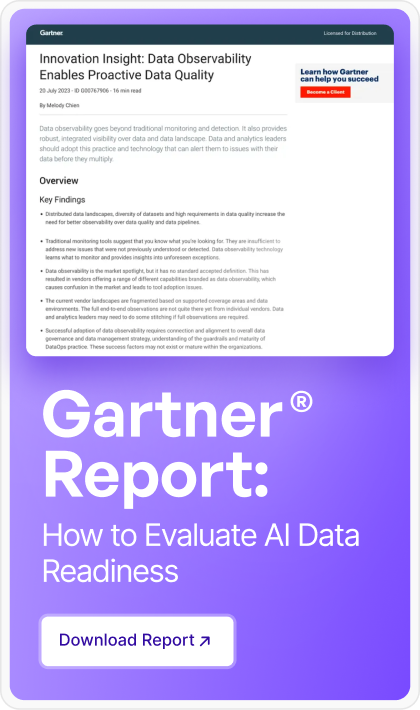Data engineers are the architects of the digital age, discreetly laying the groundwork for data-driven enterprises. A data engineer has evolved from providing behind-the-scenes support to a key player in corporate success, as businesses increasingly use data to make decisions, innovate, and compete.
Data engineers create data flow infrastructure that turns raw data into meaningful insights. They assist data-driven enterprises in navigating complicated data landscapes by streamlining data pipelines and maintaining data quality.
According to a recent report by Gartner, the demand for data engineers is likely to increase by 90% by 2025 owing to the growing reliance on data for business strategies, automation, and AI-driven insights.
What Is a Data Engineer?
Data engineers create and maintain an organization's data architecture. They build powerful data pipelines that allow firms to collect, transform, and store data for usage.
Data engineers design frameworks for data generation and ensure data quality and reliability across platforms. They collaborate with data scientists, analysts, and IT departments to ensure seamless data flow throughout the business.
The following are the key responsibilities of data engineers:
- Design and build data pipelines for extracting, transforming, and loading (ETL) data.
- Develop and maintain data warehouses to store large-scale data.
- Ensure the integrity and security of data across multiple sources and systems.
- Optimize data systems for performance and scalability, especially with large datasets.
Data Engineer vs. Data Scientist
Both data engineers and data scientists play critical roles in the data ecosystem. However, their responsibilities and skill sets are distinct.
Understanding these differences is crucial for organizations looking to build effective data teams.
Core Responsibilities of Data Engineer
The architectural and functional design of a company's data infrastructure is the responsibility of data engineers. They guarantee the dependability and efficiency of databases, storage systems, and data pipelines.
Let's analyze the primary obligations of data engineers:
1. Designing data pipelines
Automated data pipelines produced by data engineers extract, transform, and load (ETL) data from multiple sources. Data pipeline architecture guarantees effective data flow between several platforms, including structured, unstructured, and real-time data.
2. Implementing ETL processes
Design and implementation of ETL systems, which convert unprocessed data into relevant insights, is the primary responsibility of a data engineer. Data engineers handle data cleansing, structuring, and conversion into formats fit for data analysts and data scientists.
3. Maintaining data warehouses
Building and managing data warehouses, which contain large volumes of data that require processing and analysis, is part of a data engineer's responsibilities. These warehouses must be maximized for retrieval and storage to guarantee quick access to massive datasets.
4. Ensuring data integrity and security
Data integrity is essential for a data engineer. It involves verifying data at multiple stages of the pipeline, identifying any discrepancies or errors, and ensuring compliance with privacy regulations and data security requirements.
5. Optimizing data systems for scalability
Data engineers must ensure that the data architecture can scale to meet the growing data needs of data-driven enterprises. The infrastructure must be able to manage the growing volume of data as companies collect more information from various sources, without sacrificing performance.
Essential Skills of a Successful Data Engineer
Data engineer integrates technical knowledge with problem-solving capacity to build an extensive skill set. A successful data engineer must possess a range of essential skills, as the role has evolved to focus on creating effective data systems and ensuring seamless data operations.
1. Programming languages
Data engineers must be proficient programmers. The two most important languages in this field are Python and SQL.
- Python: Python is widely used for data manipulation and data pipeline automation. It provides several tools, including Pandas, NumPy, and PySpark, which streamline the processing of massive datasets.
- SQL: SQL is essential for managing and retrieving data from relational databases and is crucial for executing database queries.
2. Big data technologies
Large-scale data handling requires an understanding of big data technologies and frameworks.
- Apache Spark and Hadoop: These frameworks enable data engineers to efficiently process large volumes of data quickly. Hadoop offers a distributed storage and processing environment, while Spark is renowned for its speed.
- Kafka and Flink: Apache Kafka and Apache Flink are useful for real-time data processing. These tools help control data streams in real time.
3. Data modeling
Data engineers must design and structure databases to maximize both storage efficiency and data retrieval speed. Data modeling involves defining how data is stored, organized, and interconnected across systems to ensure data integrity and facilitate easy access for analysis.
4. Cloud computing
Modern data systems may depend on cloud services. Hence, cloud computing knowledge is quite important.
- AWS, Azure, Google Cloud: Knowledge of cloud platforms is necessary, as businesses progressively relocate their data operations to the cloud.
Data engineers must be adept at using cloud storage options, including Amazon S3, AWS Lambda for data processing management, and Azure Data Factory for data pipeline automation.
5. Data warehousing
Data engineers should be adept at running Google Big Query, Snowflake, Amazon Redshift, or another data warehouse. These allow companies to handle large volumes of organized and unstructured data, guaranteeing data availability for real-time analytics.
6. Soft skills: Problem-solving and collaboration
Beyond technical ability, data engineers need to be adept at handling problems to guarantee system performance, fix data faults, and maximize pipelines. Ensuring that data systems meet the demands of the company also depends critically on cooperation among analysts, data scientists, and business teams.
Benefits of Data Engineering Career
Data engineering is one of the most desirable tech jobs due to its myriad benefits. As data continues to grow exponentially, professionals are increasingly thriving due to the rising demand for skilled data engineers.
The following are the primary benefits of a data engineering career:
1. High demand and job security
Demand for data engineers is high, particularly in the banking, healthcare, retail, and technology sectors. With the growing reliance on data for decision-making, companies are increasingly employing skilled data engineers to build and maintain strong data systems.
2. Opportunities to work on innovative projects
Data engineers often initiate innovative projects that combine big data, machine learning, and cloud computing. These initiatives allow engineers to create real-world corporate solutions, innovate, and upgrade data processing systems.
3. Growing significance in data-driven organizations
The strategic value of data engineers is increasing as businesses become more data-driven. Their efforts reflect the success and effectiveness of data projects. Thus, they are important participants in the process of digital transformation.
Overcoming Challenges Faced by Data Engineers
The role of data engineers presents several challenges, despite the lucrative opportunities and growing demand in the field. This dynamic environment requires adaptability and a commitment to continuous learning.
Data engineers must overcome the following challenges:
- Managing large-scale data: Handling massive volumes of structured and unstructured data efficiently.
- Data integration complexities: Ensuring seamless integration of data from various sources while maintaining consistency.
- Ensuring data security and compliance: Protecting sensitive data and complying with regulations such as GDPR, HIPAA, and CCPA.
- Staying updated with evolving technologies: Continuously learning new tools, frameworks, and cloud services to stay competitive.
- Balancing performance with cost: Optimizing data systems for both performance and cost-effectiveness, especially in cloud environments.
Top Tips for Data Engineers to Excel in their Roles
Data engineers must master technical skills and apply continuous improvement and collaborative strategies to succeed.
Here are some key practices for data engineers to excel in their roles:
1. Staying updated with industry trends
Staying competitive in the evolving field of data engineering requires continuous learning about new tools, methodologies, and industry advancements.
2. Improving technical skills
The design and optimization of data pipelines depend on mastery of programming languages such as Python and SQL, as well as proficiency in cloud platforms such as AWS and Azure.
3. Adopting agile data methodologies
Agile approaches help data projects be more flexible and efficient, thus facilitating faster and more dependable delivery of data solutions.
4. Ensuring data quality
Data pipelines ensure the delivery of correct, consistent, and high-quality data through automated validation and error detection processes.
5. Collaborating with data teams
Strong collaboration among analysts, data scientists, and business teams ensures that the data infrastructure aligns with the company's needs.
Top Data Engineering Tools and Technologies in 2024
Data engineering technologies and tools have evolved to efficiently handle, process, and analyze massive amounts of data.
Here are some of the top tools and technologies that are essential for data engineers in 2024:
1. Apache Spark
Apache Spark is one of the most commonly used tools for handling large volumes of data. Its in-memory processing features enable data engineers to handle vast amounts of data.
2. Apache Airflow
Apache airflow simplifies data process automation and maintenance by enabling users to create workflows as directed acyclic graphs (DAGs), providing a user-friendly interface.
3. Snowflake
Snowflake is garnering recognition as a cloud-based data storage option. It enables data engineers to store, manage, and analyze structured and semi-structured data in a cost-effective and scalable manner.
4. Databricks
Built on Apache Spark, Databricks is a consolidated analytics tool that allows data engineers and data scientists to work on data processing and machine learning projects simultaneously. It helps manage large datasets and accelerates the creation of AI-driven solutions.
5. Amazon Redshift
Designed as a cloud-based data warehouse tool, Amazon Redshift enables data engineers to execute sophisticated searches. Its scalability and speed help companies evaluate data rapidly and economically.
6. Kafka
Designed for open-source stream processing, Kafka enables data engineers to create real-time data pipelines.
Future Trends in Data Engineering Roles
The future of data engineering will be shaped by technological advancements and evolving data infrastructure management practices.
The following major trends would characterize data engineering over the next few years:
1. Data engineers as strategic architects
Data engineers have long been seen as operational helpers. Currently, data engineers are moving into strategic roles, since businesses are largely driven by data.
Data engineers develop not only data pipelines but entire data platforms. They assist in determining data infrastructure, system integration, and how data can drive business innovation.
2. Integration of data observability
Data engineers are prioritizing data observability. Businesses need data engineers to create real-time data pipeline visibility tools and frameworks. Data engineers must maintain data quality, integrity, and availability across increasingly complex systems, making data observability necessary.
3. Rise of hybrid data architecture
Hybrid data architecture, where data engineers design systems that integrate both on-premises and cloud environments, is gaining popularity as businesses seek greater flexibility in managing and processing data.
Data engineers must design infrastructure to integrate cloud-native data solutions with legacy systems in order to maintain operational continuity.
4. Emphasis on real-time data analytics
Data engineers increasingly build data infrastructure that supports real-time data analytics. Businesses that require quick data insights for supply chain management, fraud detection, and customer experience customization drive this trend.
5. Automation of data pipeline management
Automation is transforming data pipeline management for data engineers. As firms grow, data validation, anomaly detection, and system monitoring must be automated.
Data engineers increasingly use AI-driven automation solutions to streamline pipeline management and maintain data quality without manual intervention.
6. Data privacy and compliance
Global data privacy regulations such as GDPR, CCPA, and HIPAA require data engineers to ensure compliance. Data engineers design systems that efficiently process data, protect sensitive data, and meet regulations. Data governance frameworks are also becoming more common in data engineering.
Boosting Data Engineer Productivity with Acceldata
Data engineers play an important role in designing data architecture that drives modern businesses. From data pipelines to ensuring data scalability and quality, they help companies leverage data for strategic insights.
Data engineers must stay ahead of emerging technologies and automation tools for real-time data processing, cloud-native solutions, and data observability.
Acceldata's platform enables data engineers to maximize efficiency and propel corporate success through real-time monitoring, automated data quality management, and cost optimization.
Data engineers are poised to continue playing a vital role in driving data-driven innovation within businesses. The Acceldata platform can help them enhance data engineering processes and streamline data infrastructure.
Contact Acceldata today to optimize your data engineering workflows!







.webp)







.webp)
.webp)


